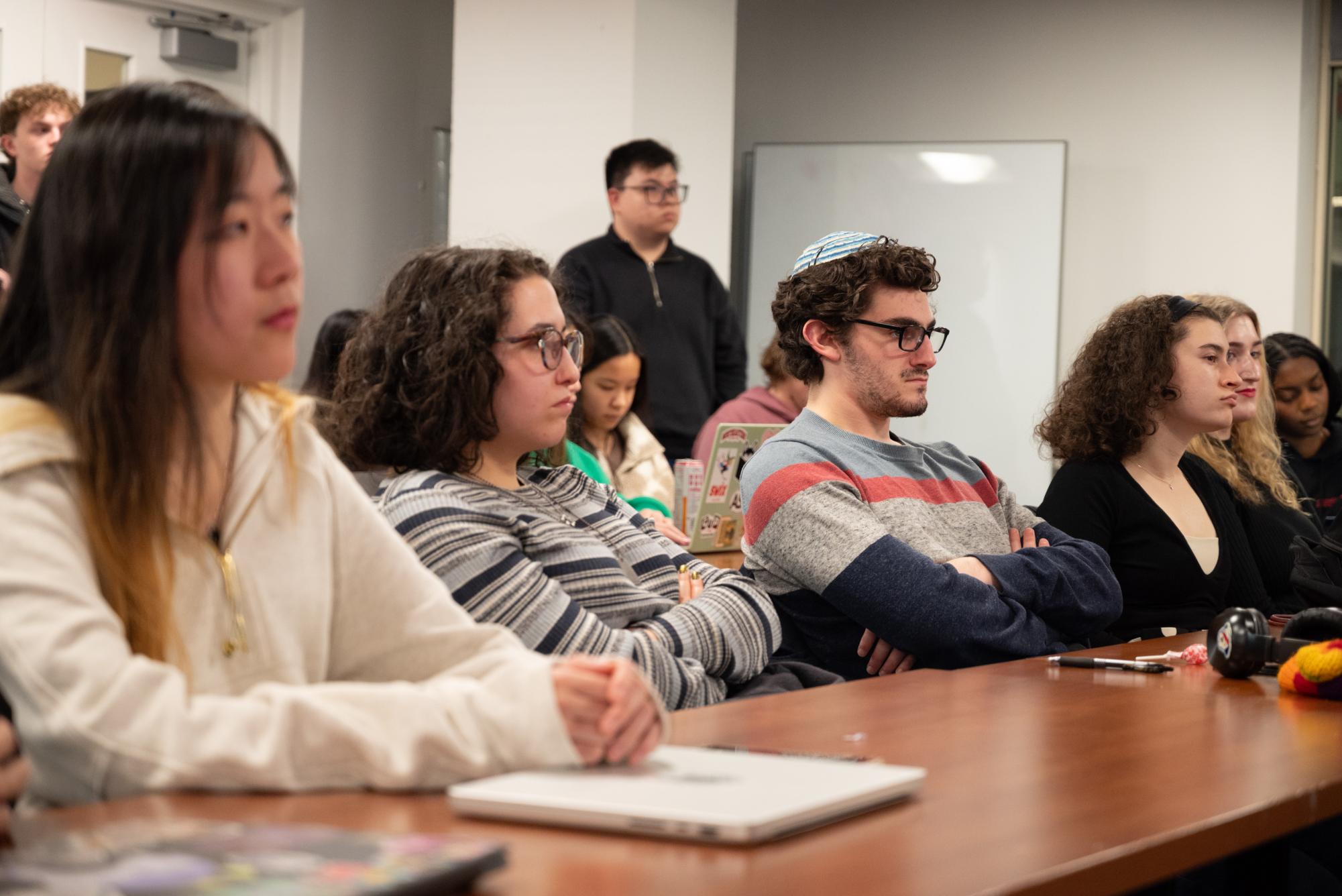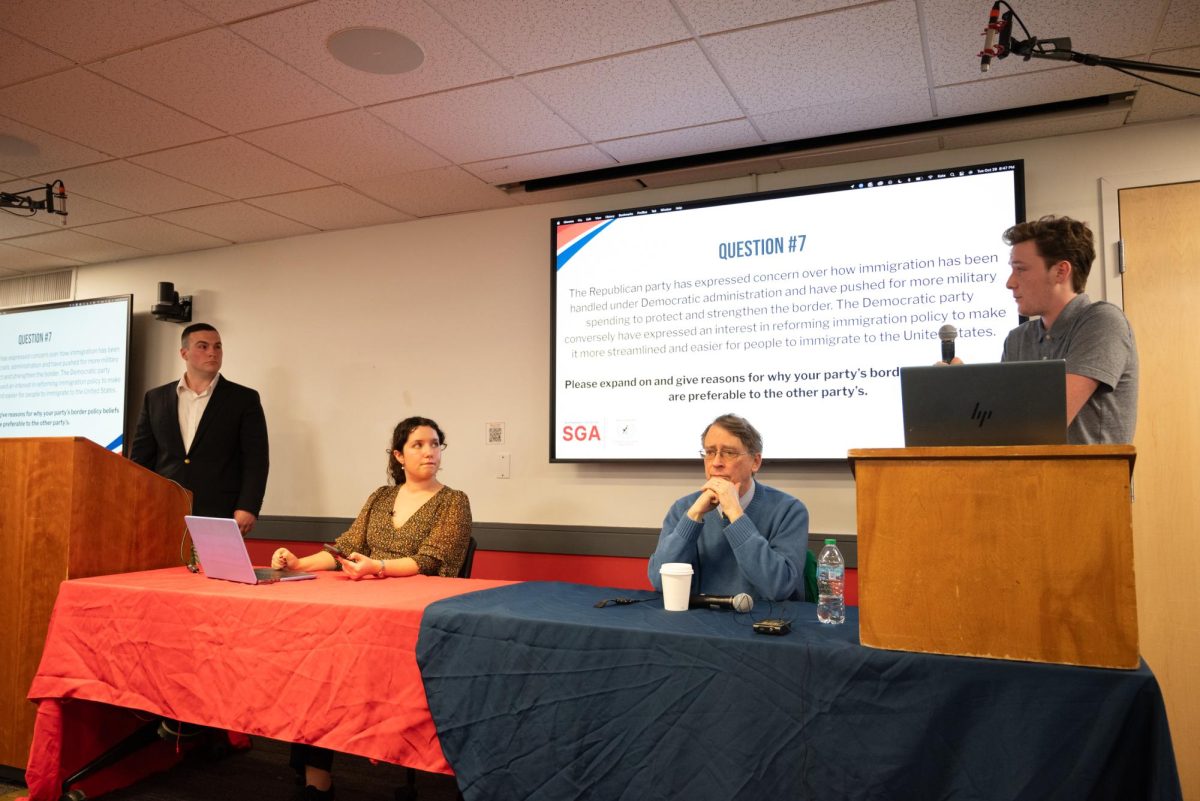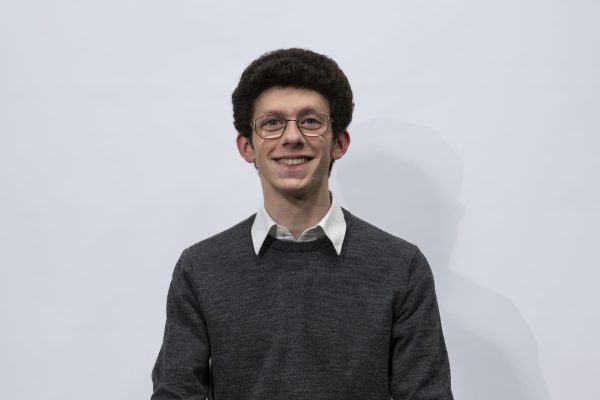On Oct. 29, the Student Government Association held a presidential debate between Northeastern’s College Republicans and College Democrats, with topics including some of this election’s most prominent issues: immigration, abortion and the economy.
In its entirety, the debate took about one hour, which is slightly shorter than the length of a traditional 90-minute presidential debate. Both sides were given two minutes to talk after a question was posed, then a minute each for rebuttal. There were two 30-minute segments within the debate, the first focusing on the general parties and their values and the second centering around each presidential nominee. There were about 50 attendees to watch the debate.
Throughout the hour, the debate grew tense, prompting interjections, jabs and call-outs of the cracks and faults in the rival’s plans. Here are the topics they covered.
Size of government
The first topic was the power and reach government should have into citizens’ lives. Vice President of the College Democrats Giovanni Falco, a fourth-year criminal justice and political science combined major, fired shots at the Republican side, arguing for a “big government.”
“In recent history, Republicans have failed to invest into basic social programs and to average families that are struggling,” Falco said. “The government has to care for its citizens. The Republican Party doesn’t care about that.”
Vice President of College Republicans Matt Cosentino, a fourth-year political science major, brought the argument back to policy, saying “A lot of policy will sound good, but does it actually do good?”
Climate change
The second question was about climate change. One of the moderators, political science professor and College Republicans advisor, William Mayer asked Cosentino and Riya Piryani, a first-year computer science and politics, philosophy, and economics combined major and College Democrats member, to explain why their party’s environmental policy is more beneficial to the country.
Piryani shared examples of Democrats’ past environmental policies and how that has created “a more sustainable America.” She took a shot at Donald Trump over his decision to withdraw the U.S. from the Paris Climate Agreement in 2017, making the U.S. the only first-world nation not part of the climate change treaty. President Joe Biden has since rejoined the agreement.
Cosentino argued that the country was energy independent under the Trump administration, leading to lower gas prices. He also argued against the United States’ participation in the Paris Agreement because of China’s involvement.
Piryani rebutted this statement, acknowledging that the Paris Agreement does not “take China fully into account.” She then talked about Trump calling climate change a hoax and the severity of the problem of climate change across the world.
Abortion
The topic of abortion and Roe v. Wade came up twice during the debate, once in the first round and once in the second. Piryani and College Republicans member Athena Lebron, a second-year health science and business administration combined major, debated each other in both instances.
Lebron began by saying that “abortion is another form of birth control at this point.”

“A lot of the time the Democrats try and use a scapegoat of saying what about the cases of rape, incest [and] the mother’s life,” Lebron said. “I feel like this can’t really be the main thing that we focus on, although there are things that happen and are horrific. Mostly the Republican party does tend to be a little more lenient towards stuff like that. They do end up giving the choice to an abortion when it does come to those cases. But even then, it is literally less than 0.5% of these abortions that occurring due to incest [and] less than 1% are due to rape.”
Piryani focused her statement on fetal viability and argued that getting an abortion does not equate to killing a baby because the fetus is dependent on its mother.
“Roe v. Wade was also protected under the 14th Amendment, so it was a federal right to abortion until fetal viability,” Piranyi said, adding that many women take risks to get abortions out of their state since Roe v. Wade was overturned in 2022.
Kamala Harris v. Donald Trump
For the second part of the debate, members of both camps debated individual presidential candidates Kamala Harris and Donald Trump.
In response to the opening question — “What do you think is the best argument for voting for your party’s presidential candidate?” — Falco pointed to the difference in democracy under the Harris’ and Trump’s administrations, discussing Jan. 6, 2021 and what he called Trump’s “fascist” tendencies. He compared Trump’s “concepts of plans” to Harris’ plans, which are listed on her website.
First-year international business major Beliza Showman’s first statement was about how the “political system is pretty screwed, ultimately.” She continued to argue that no one is being authentic in the 2024 presidential race. Later, Showman defended Trump’s actions and speech Jan. 6, 2021 and questioned whether the events on this day were an insurrection.
“[In] the quote, he says, ‘Do it peacefully,’” she said, referring to Trump’s comments to his supports in Washington, DC just hours before they stormed the Capitol building. “And my point with bringing that up, not whether or not Jan. 6 was an insurrection or not, you can argue however you want to say it, but the media took it and misconstrued it completely. And we’ve seen that countless times over and over.”
Consentino and Falco gave closing statements for their two respective parties, and both focused on the state of democracy. Falco emphasized Harris’ experience and emphasis on putting money back into the average Americans’ pockets. Cosentino acknowledged that Jan. 6 was not a good day for the country but encouraged the audience to compare Trump’s four years versus Harris’.
There was no declared winner of the debate, with both sides having good arguments and also some faults in their statements or rebuttals.
“Our debate prep was definitely subpar, in my opinion. I think we did the best we could under the circumstances,” said Will Burke, one of the Democratic debaters and a first-year civil engineering major.
Third-year political science and international affairs combined major Kate Mittelhauser, the executive director of elections for the Student Government Association, said that she did not feel there was a direct winner in the debate.
“I don’t think that there was necessarily a clear winner,” Mittelhauser said. “I think that both sides had their topics that they did well on and it was really more focused on educating the public.”
Editor’s note: This article was updated at 10 a.m. Nov. 11 to correct the estimated number of people in attendance.
The Huntington News is dedicated to serving the Northeastern University community with original, professional reporting and creating an environment in which student journalists can learn from one another. Support an independent, free press at Northeastern University with your donation today.












